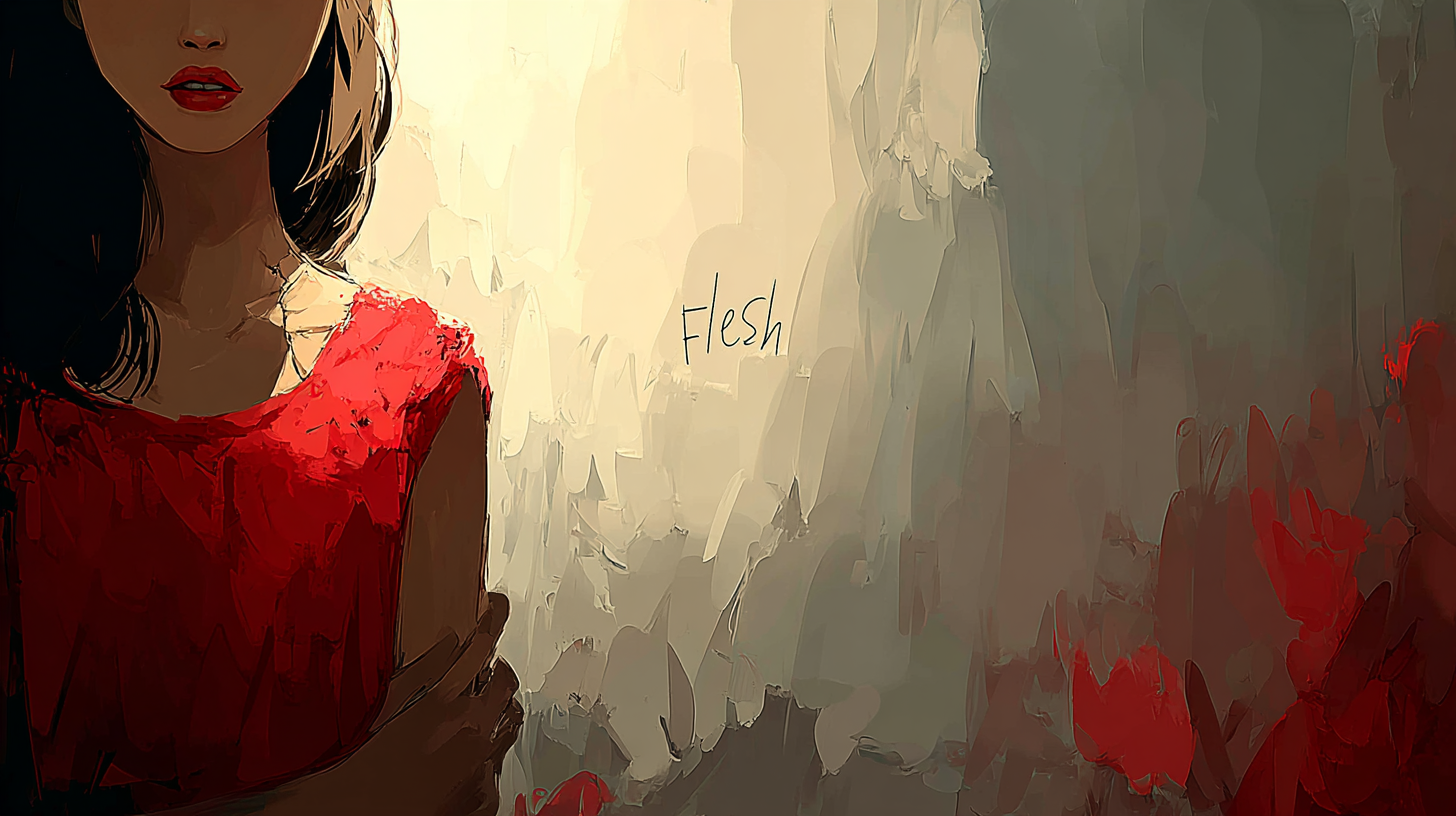“Flesh” means the soft parts of a body or adding details to an idea.
「flesh」は、人や動物のからだの「肉」や、考えを詳しくする「肉付け」のこと。
以下は英単語 “flesh” に関するストーリー型学習コンテンツです。まずは大枠の意味を理解して最後の文章で確認しましょう。
「flesh」の主な意味(main meaning)
| 品詞 | 意味 | 発音記号 | 英語例文 |
|---|---|---|---|
| 名詞 | (人や動物の)肉、皮膚 | /fleʃ/ | The lion tore the flesh from its prey. |
| 動詞 | 肉をつける、肉付けする、詳細に説明する(通常「flesh out」) | /fleʃ/ | She fleshed out her story with vivid details. |
「flesh」の語源(etymology)
「flesh」は古英語「flæsc」から来ており、「柔らかく、食べられる体の部分」というイメージが基本です。そこから派生して、アイデアに「肉付けする」意味でも使われるようになりました。
「flesh」の類義語(synonyms)
| 類義語 | 英語例文 |
|---|---|
| meat | He prefers white meat like chicken. |
| tissue | The wound damaged the soft tissue. |
| substance | Add more substance to your argument. |
| develop | She developed her plan carefully. |
| elaborate | He elaborated on his proposal in detail. |
「flesh」の反義語(antonyms)
| 反義語 | 英語例文 |
|---|---|
| bone | The dog chewed on a big bone. |
| outline | She gave only a rough outline of the story. |
「flesh」のコロケーション(collocations)
| コロケーション | 英語例文 |
|---|---|
| flesh and blood | He is my own flesh and blood. |
| in the flesh | I finally met her in the flesh. |
| flesh out a plan | They fleshed out the plan before presenting it. |
| torn flesh | The animal’s claws tore through the flesh. |
| human flesh | The fire burned everything, even human flesh. |
「flesh」の2項表現(binomials)
| 2項表現 | 英語例文 |
|---|---|
| flesh and blood | No robot can feel like flesh and blood. |
| skin and flesh | The knife cut through skin and flesh. |
英語ストーリー(english story)
Title: Fleshing Out the Idea
Emma worked in a small office where she helped design advertisements. One day, her manager asked her to create a new concept for a health campaign. She had a rough outline, but it wasn’t clear enough. “You need to flesh out your idea,” her manager said. Emma knew that meant adding more details and making it easier to understand.
She stayed late that night, thinking deeply. She wanted the campaign to show that health isn’t just about bones, but also about taking care of the flesh and blood—real people with feelings. She included images of people exercising, eating well, and spending time together. The next morning, she presented her new plan.
Her manager smiled. “Now it has real substance,” he said. “You developed it well.”
Emma felt proud. Her idea had turned into something real and meaningful—in the flesh.
和訳
タイトル:アイデアに「肉付け」する
エマは小さなオフィスで広告デザインの仕事をしていました。ある日、上司から健康キャンペーンの新しいコンセプトを考えてほしいと頼まれました。彼女は大まかな(outline:概要)案を持っていましたが、はっきりとはしていませんでした。「もっとアイデアに肉付け(flesh out:肉付けする)しないといけないよ」と上司が言いました。エマはそれが、もっと詳しく説明する必要があるという意味だとわかっていました。
その夜、彼女は遅くまで残って真剣に考えました。健康とは骨(bone:骨)だけでなく、人間の肉体(flesh:肉)や心も大事だと伝えたかったのです。彼女は、運動する人々、健康的に食べる人々、仲良く過ごす人々の画像を加えました。次の朝、彼女は新しい計画を発表しました。
上司は笑顔で言いました。「今度は中身(substance:内容)があるね。よく練られている(developed)よ。」
エマは誇らしく感じました。彼女のアイデアは、実際の(in the flesh:実際に)意味のあるものになったのです。
「flesh」のQ&A
- Qfleshと意味が近い単語には何がありますか?
- A
「meat」「tissue」「substance」「develop」「elaborate」などがあります。それぞれ文脈に応じて使い分けられます。たとえば、「meat」は食べ物の肉、「tissue」は柔らかい体の組織、「substance」は内容や実質を意味し、「develop」や「elaborate」は考えや計画を詳しくするという意味で使われます。
- Q「develop」と「flesh out」の違いは何ですか?
- A
「develop」は全体的に成長・発展させる意味で使われ、「flesh out」は既にあるアイデアなどを具体化・詳細化するニュアンスです。たとえば、「She developed a new idea.」は新しく作ったという印象で、「She fleshed out her idea.」は元のアイデアに肉付けして明確にしたという意味になります。
- Q「flesh」の反対の意味を持つ単語は何ですか?
- A
「bone」(骨)や「outline」(概要)が反対のイメージになります。「bone」は硬くて中身の少ない部分、「outline」は詳細を含まない表面的な構造を示します。
- Q「outline」と「flesh out」はどう違いますか?
- A
「outline」は考えの骨組みや概要だけを示すのに対し、「flesh out」はその概要に詳しい内容を追加して完成させる行為を指します。例として、「This is just an outline. We need to flesh it out.(これは概要にすぎない。肉付けが必要だ)」というように使われます。
- Q「flesh」に関連するよく使われる表現(コロケーション)には何がありますか?
- A
「flesh and blood(肉親・人間らしい存在)」、「in the flesh(実際に・現実で)」、「flesh out a plan(計画に肉付けする)」、「torn flesh(裂けた肉)」、「human flesh(人間の肉)」などがあります。状況によって身体的な意味と比喩的な意味の両方で使われます。
- Q「in the flesh」はどういう意味で使われますか?
- A
写真やテレビでしか見たことがない人に実際に会ったときなどに使います。たとえば、「I finally met the singer in the flesh.(ついにその歌手に実際に会えた)」というように使われます。
- Q「flesh and blood」はどんな意味ですか?
- A
直訳すると「肉と血」ですが、「肉親」や「生身の人間」を意味します。家族関係や感情のある人間を表すときに使います。例:「He is my own flesh and blood.(彼は私の肉親です)」
| 単語 | 日本語の意味 | ニュアンスの違い | よく使う場面 | 例文(英語) | 例文(日本語訳) |
|---|---|---|---|---|---|
| flesh | 肉・果肉・柔らかい部分 | 骨・皮ではなく、「体のやわらかい部分」全般。人間や動物、果物にも使える。 | 体の説明、文学、果物など | The knife cut through the flesh of the fruit. | ナイフが果物の果肉を切った。 |
| meat | 食用の肉 | 食べるための「肉」。肉料理やスーパーで売っている「お肉」。 | 食事、料理、スーパーなど | We had chicken meat for dinner. | 夕食に鶏肉を食べた。 |
| body | 体・身体 | 「人間や動物の体」全体を指す言葉。flesh は body の一部。 | 医学、スポーツ、日常など | He hurt his body during training. | 彼はトレーニング中に体を痛めた。 |
| pulp | 果肉・ドロドロした中身 | 果物の中のやわらかくて水っぽい部分。果汁やスムージーでよく使う。 | フルーツ、飲料、歯科など | The orange juice has pulp in it. | このオレンジジュースには果肉が入っている。 |
| skin | 皮膚・皮 | 「体の外側の皮」。flesh の外側にある部分。果物の皮にも使える。 | 美容、医学、料理など | She has very soft skin. | 彼女の肌はとてもやわらかい。 |
| tissue | 組織・細胞の集まり | 体内の「細胞でできた組織」。flesh の中のさらに専門的な言い方。 | 医学・生物学・病理など | Muscle tissue helps us move. | 筋肉組織は私たちの動きを助けている。 |
やさしい解説
- flesh は「皮の下にあるやわらかい部分」。体でも果物でもOK。
- meat は「食べる肉」。スーパーやレストランで見る単語。
- body は「体全体」。その中の一部が flesh。
- pulp は「果物の中のドロドロした果肉」。
- skin は「体の外側・皮」。人にも果物にも使える。
- tissue は「体の中の小さな組織」。医学や理科で使う。



コメント